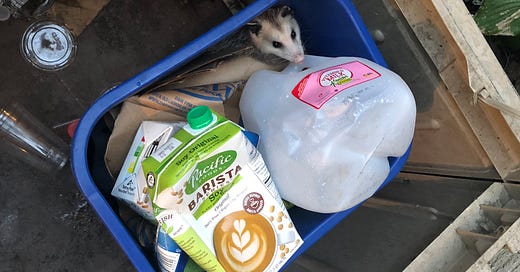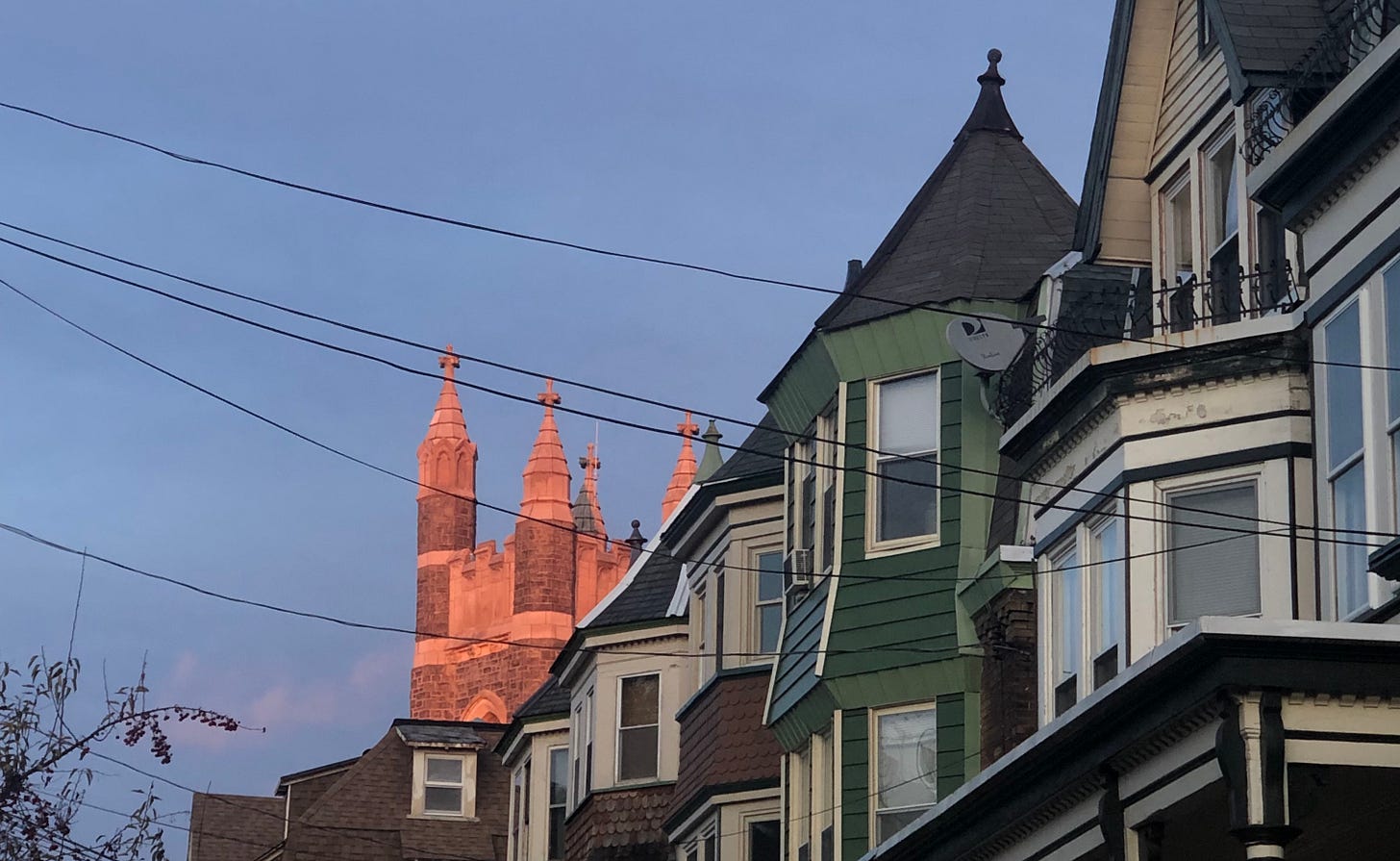Last month, a supermajority of workers at Green Line Cafe announced their new union with PJBWU Local 80. When I heard the news, I wished I could travel backwards and tell my past self. Five years ago, that scared barista on the organizing committee would have been thrilled.
Green Line was my first job in food service. The West Philadelphia neighborhood chain was a small family business, owned and operated by brothers-in-law Dan and Douglas. When I joined the staff in 2018, I was charmed to learn they were Mennonites (I attended a Menno middle school) and that Douglas was an established painter who had graduated from PAFA. They were unpretentious and kind; a reprieve from the tense, hierarchical museum jobs I was hoping to get away from.
At first I enjoyed barista life. Tips were good: I could walk away with $40 to $60 after a 5-hour opening shift. I ate a lot of free food from the house-made menu. I appreciated the friendly regulars and the cafe’s deep roots as their neighborhood square.
But, about a year and a half into the job, I knew that I either needed to quit or take on a serious organizing effort.
The trouble began when my paychecks came days late without explanation. I maxed out at an hourly wage of $9, only after I threw a small fit, because I learned a coworker hired after me made that amount while I made $8.50.
I was the sole worker in the cafe for most shifts. I dealt with broken equipment, stressful customer interactions, and a generally disorganized environment with little communication or transparency from management.
I had a routine of showing up in the morning to find the refrigerator had broken down. I’d have to pour a dozen gallons of spoiled milk down the drain while still attempting to make customers’ orders. An unaddressed leak from the sink rotted the boards under my feet, and my manager expressed genuine concern that we would fall through the floor one day.
Though these complaints traveled up the chain to the owners, there never seemed to be money for these critical repairs. Yet, every few years, Dan and Douglas would somehow find the cash to invest in a new cafe. They stretched to an unwieldy seven locations across the city and even opened a roastery.
Some of the issues at work could have been fixed for free. Requests for transparency and communication were often sidelined by a top-down management philosophy that struggled to keep tabs on the growing business.
Though I had pleasant interactions with the owners, I started to resent them. I would open Instagram after an unreasonably stressful shift, and there would be Douglas, strumming a guitar in his gorgeous light-filled studio space. In this massive studio building he owned and rented to other artists, I watched him make tedious paintings and travel with them to international shows.
Meanwhile, Doug’s practice was supported by a bunch of people like me: young working artists who didn’t get passive income from being landlords or business owners, so we found ourselves burning out in these high-turnover food service jobs, trying to balance the work with whatever studio time we had leftover energy for.
I didn’t necessarily think the owners were bad people, but I began to question the dissonance between their stated values as Mennonites and the way they ran their business. In a hilarious coincidence, I realized I knew their pastor, Jay Bergen, through other organizing work. We ended up having conversations about this dynamic between personal religious character and power dynamics in the capitalist workplace—a theme that would eventually appear in a lot of my artwork.
As I made an effort to get to know my coworkers, I realized they could relate to my ironic position of exploited and unempowered artist; as many of them were also writers, painters, and musicians. One of my coworkers played in Radiator Hospital. Another co-published the literary magazine The Shoutflower. I sensed that these people might share my dissatisfaction, since we worked in the same chaotic environment, but I was still extremely nervous to bring up “the 1-on-1 conversation” to them.
Here, I learned an essential organizing lesson: you can never predict or assume how a worker will react to the union conversation.
I remember one of my first attempts to initiate the conversation with my coworker Heather. She seemed friendly and positive and never complained about work to me, as our brief chats didn’t go beyond small talk. But the moment I asked if she wanted to get together and discuss things outside of work, her whole demeanor changed. Her voice dropped low and serious, her eyes got wide, and she said, “yes. I really, really want to talk.”
As it turned out, Heather was in the sweet spot: deeply unhappy with certain aspects of our job, but also willing to step up and fight for the changes we wanted. She joined the organizing committee and our small group started having bi-weekly meetings.
Another lesson: the union conversation will dramatically transform your relationships.
As I worked up the courage to approach different coworkers at Green Line, this new kind of connection would open something up between us. There were people I’d seen at work every day for years, who I’d basically decided I had little in common with, but suddenly we were leaning on each other with more vulnerability than I felt in some long-running friendships.
Aside from baristas, there were delivery workers—Carter, Chin, Alex, and Pomona—who I often encountered during shifts. After the conversation, they transformed into friends and confidantes who were enthusiastic about the union.
I’ll never forget when Alex found me crying in the basement after a shift, because my manager had suddenly cut my hours for reasons that lacked transparency. Alex took me on a drive to Restaurant Depot and we walked around, marveling at bulk frozen ingredients and pallets of canned goods, while he listened and cheered me up.
My friend Adam’s seventeen-year-old child, Marley, got hired as a dishwasher at Green Line. I found myself strategizing about the union with them, as if they weren’t the same age as the students at my weekend art teaching gig.
Marley and the delivery staff had relationships in the kitchen, and through those connections, I discovered the kitchen staff was saddled with difficult work for stagnant, non-tipped wages. In restaurants, the division between front and back of house staff often falls along lines of class, race, and language; and a lack of strong relationships across this barrier will be the first thing bosses exploit when they need to crush a union effort. So, when several kitchen workers at Green Line stepped up and joined the organizing committee, I started to realize we were building something that could genuinely win.
Of course, not every conversation with my coworkers went well. The lesson of unpredictable worker responses also proved true in the other direction. I approached workers who were visibly unhappy with the job, thinking they were already so agitated that they’d be easy to bring into the fold. But, often, the people who loudly shared a left-leaning or even union-friendly worldview were not ready to make those commitments in their own workplace. West Philly is known for its counter-culture streak, and I learned through some rough conversations that a person’s immersion in a punk scene didn’t necessarily translate to political radicalism at work.
Many of the loudest critics at Green Line preferred to just quit and hope the next place treated them better. One coworker declined to organize because she was planning to open her own cafe: Mina’s World, where she aspired to run a more principled and equitable business. If you’re reading this from West Philly, you probably remember how that ended.
I don’t mean to dismiss every worker that told me “no.” Inviting someone to sign a union petition is asking them to take on genuine risk. I worked with people who supported families and children. Some of their lives were very enmeshed with the company; like my two coworkers who not only worked for Dan and Douglas, but rented an apartment from them above one of the cafes. Like workers who lived in company towns of yore, bosses who doubled as landlords had significantly more power to destabilize their lives.
I had conversations with a few people who felt too much fear to commit to the union effort. But when the new Green Line union went public, I was delighted to read a few of their names on the new petition. People change, especially when the workplace stays the same.
When the COVID-19 lockdown hit, service industry workers found ourselves in a perilous position. We didn’t know what the future held; but hopeful members of the Green Line union were committed to caring for each other, so we started a public relief fund that our community and regulars could donate to. When “essential workers” were permitted to return to our jobs, some of us returned to the cafes, while others guided each other through signing up for federal relief. In that uncertain window before unemployment benefits kicked in, we raised and distributed thousands of dollars to our coworkers according to a self-evaluated system of need.
When we learned more about COVID and its airborne transmission, my coworkers who returned to work at Green Line asked for masks and protective measures. In the kitchen, where staff had to work in closer proximity, tensions rose over the meager pay for conditions that posed a clear health risk. After hitting dead ends in communication with the owners, Chin wrote a letter stating they wouldn’t work without hazard pay, and a supermajority of kitchen staff signed it. They won the demand.
I never returned to Green Line after the pandemic. During lockdown, my art practice had the time and space to flourish, and it became a viable source of income for the first time. But, honestly, there were bigger reasons I didn’t want to return to Green Line. I was emotionally burnt out from the job and the union drive. I had taken the entire process so personally that even though the pandemic lockdown had thrown a massive wrench into our hopes of pulling it off, I still blamed myself for the failure and dissolution of the union.
Every day, I thought about my manager cutting my hours and telling me I had a bad attitude, and I thought about the owners telling me that transparency and good working conditions and decent pay were literally impossible at this job. I questioned my reality; I wondered if it had been nonsensical to pursue a union at a cafe job, or whether the classist jerks on the internet were right about baristas being unskilled and unserious; that I was not a real worker at all.
Early on in lockdown, my neighbor and coworker Denali brought me some flowers. They lived just three houses down, but I might never have met them if we didn’t work at Green Line together, and we might not have gotten past cordial hellos if it weren’t for the union. Denali showed up at my door with beautiful purple irises and thanked me for the effort I had put into organizing.
It occurred to me then that all my coworkers were not, in fact, angry at me for roping them into a wild goose chase that ultimately failed. This experience had been transformative for a lot of them, too. When I look back at pictures from that time, I remember the kindness of all the people I worked and organized with, and how we supported one other through everything.
Reading the Green Line workers’ union letter made me feel so proud. These people deserve an excellent work environment. And, honestly, what underpinned my entire effort at Green Line was the belief that it could be a good job. A strong worker contract paves the way for a lower turnover rate, happier and easier customer service, and smoother operations. After all, no one understands a job more intimately than the person doing it, and empowering those workers on the ground will only create a healthier, more sustainable environment for everyone involved.
Local 80 is close to the tipping point of representing the majority of baristas in Philadelphia. A pipe dream only five years ago, this worker-led union is now very real and powerful. Its members negotiate strong contracts with competitive wages, benefits, and real teeth: they don’t include the no-strike clause that effectively kneecaps most contemporary contracts. After all, we know that bosses fight dirty—see Ori Feibush closing his OCF cafes out of spite—and workers need every tool in their arsenal to push back.
Congratulations, Green Line workers! I’m looking forward to watching what you all fight for and win.
Labor Intensive Recommendations
Fragile Juggernaut — So far, I have listened to this podcast on the history of the CIO twice. It’s helped with my research for my current tapestry project.
Kinds of Kindness — The new Yorgos movie(s) is great.
Austerity Ecology & the Collapse-Porn Addicts by Leigh Phillips — Enjoying this book that mounts an argument against some leftist positions on growth, consumption, and overpopulation and the future of the planet.







“People change, especially when the workplace stays the same.” 🥲
This was beautiful!! i am a former elixr barista (pre-union) and current proud and grateful member of a grad student union (and non-unionized bar worker). it's been so inspiring to watch this rising wave of barista unionization in philly and elsewhere, and i'm really interested to see if it will spread to the rest of the industry. the FOH-BOH segmentation is so real (and not an issue at lots of coffee shops that don't have separate BOH staff). it's so cool that green line workers were able to overcome those barriers <3 i'm rooting for you, green line workers!!